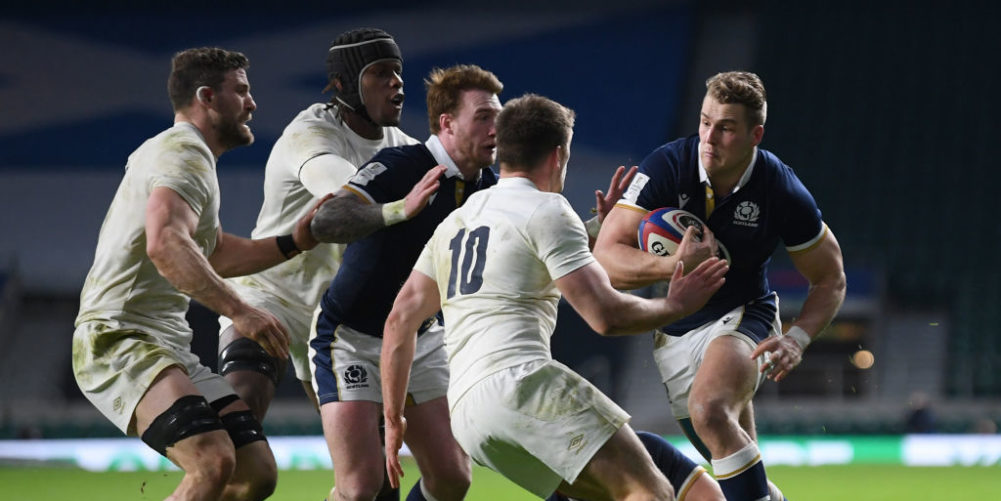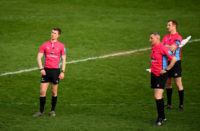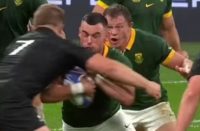by CHRIS HEWETT
The Six Nations champions' abject surrender of the Calcutta Cup unleashed a torrent of jokes, the sharpest of which concerns a man given 80 minutes to live by his doctor. “Is there anything I can do?” he asks, panic-stricken. “You could watch England play rugby,” comes the reply. “Will that cure me?” “No, but it will make the time you have left seem like an eternity.”
There's plenty more where that came from, but are we being wholly fair to Eddie Jones and his shop-soiled charges? Was it really the grimmest England showing since white-shirted dinosaurs roamed the earth?
Sir Clive Woodward was in no doubt as to the poverty of the performance. “That was the worst I have ever seen England play, by some margin,” the good knight pronounced in his newspaper column.
This set tongues wagging among those who had travelled with the national team to the southern hemisphere in 1998 and experienced the full torment of the “Tour from Hell”. Why? Because the head coach who presided over the 76-0 loss to the Wallabies in Brisbane looked uncannily like Clive Woodward.
In fairness, his remarks after the slightly narrower 11-6 defeat by Scotland were more nuanced than some would have you believe.
Rather like the New Labour strategist Peter Mandelson, whose admission that he was “intensely relaxed about people getting filthy rich” was treated as manna from heaven by opponents who conveniently forgot the “as long as they pay their taxes” bit, Woodward's line contained a caveat. It was, he said, the worst performance “given what was at stake”.
It is undeniably true that a championship contest with Scotland carries more significance than a lemming charge of third-choicers against a fullstrength Australia, but whether this will save the former coach from a public diagnosis of “selective memory” syndrome remains to be seen.Words have an afterlife, and when it comes to rugby, the most memorable ones fall into three broad categories.
The first might be termed “evocative”. Alun Williams of BBC Wales did the language of the game a profound service when he described John Taylor's match-winning kick at Murrayfield in 1971 as “the greatest conversion since St Paul”. That wasn't commentary. It was poetry.
Similarly, we have the age-old tale, best attributed to the prolific author “Anonymous”, about the talent-spotter in the valleys watching a club player performing miracles in the No.10 shirt. “Who's the chap at outsidehalf ?” he asks a fellow spectator. “That's God, but he thinks he's Barry John.”
Then there are comments of the controversial variety, some of them “zingers” and others “howlers”. Eddie Jones has long been associated with both. On the one hand, he played the All Blacks like a Stradivarius before the World Cup semi-final in 2019. “New Zealand talk about walking towards pressure,” he said, eyes glinting. “This week, the pressure is going to be chasing them down the street.”
On the other, he chose a sponsors' event to describe the Irish as “scummy” and Wales as a “shit little place”. Why would someone blessed with Jones' brainpower think for a millisecond that those words would remain in the room?
Not that Fast Eddie's verbal grapeshot has ever rivalled the regular scattergun fusillades of Peter de Villiers, the Springbok coach when the British and Irish Lions last visited South Africa in 2009.
After Schalk Burger and Bakkies Botha found themselves in the dock on serious charges of skulduggery perpetrated during the Pretoria Test, the man from the winelands of the Western Cape offered us some pearls of wisdom. (Or should that be ‘Paarls' of wisdom?)
“We must understand very, very clearly that rugby is a contact sport,” he stated. “If we are going to have games decided in the boardroom and in front of television cameras, let's ask ourselves if we really respect it. Do we want to be a part of it, or do we want to go to the nearest ballet shop, get some nice tutus and get some dancing going on. There will be no eye-gouging, no tackling, no nothing. And then you'll enjoy it.”
A bad point, badly made.
The final grouping can be filed under “truth”. No hyperbole, no grandstanding, no trace of rhetorical pyrotechnics. Just the gospel of rugby, honestly preached.
Carwyn James did this better than anyone: indeed, the publication of his collected sayings would be the nearest thing we have to a rugby bible. The “King James Version”, naturally.
It was Carwyn who said, back in the dim and distant when the game was still amateur: “Referees strut and talk far too much. They must become less and less important.” It was Carwyn who proclaimed that “adventure and error go together”.
And it was Carwyn who wrote the following: “This new midfield ‘crash ball' is a disaster – hunks of manhood with madness in their eyes, batteringram bulldozers happy to be picked off on the gain-line by just-as-large hunks from the opposing side. For what? Just to do it all over again.”
Forty years on, those sentences sting like nettles.
Rugby Union is a game of words as well as actions and as Carwyn would undoubtedly have agreed, the very best of both must be properly thought through and expertly delivered. The rest are two a penny.
Captain's referral? Charter to cheat!

QUITE possibly the last thing rugby needs right now – leaving aside another caterpillar ruck – is the introduction of a “captain's referral” along with lines of cricket's incoherent, unfit-forpurpose and wholly infuriating DRS system.
So what happened last week? Yep, you guessed it: the announcement of a “captain's referral” experiment as part of the forthcoming Super Rugby Aotearoa tournament in New Zealand.
It is a fact long established that rugby governance is subject to the Second Law of Thermodynamics – the one telling us that sooner or later, everything turns to pooh. Therefore, we should have known this was coming.
Even so, the sense of foreboding is acute. Under the new arrangements, a skipper can “go upstairs” once during a game to highlight an act of foul play, draw attention to an infringement in the build-up to a try, or question any decision in the last five minutes of the contest.
The potential for “gamesmanship” – or, as it is more properly known, naked chicanery – is obvious. Cheating is already stitched into the fabric of the sport. How long before it becomes the actual material?
Advantage to France

NO RELEGATION from the Premiership at the end of a pandemic-distorted season? Fair enough. No relegation until 2025? That sounds more like an admission of defeat in the great club rugby battle with France.
There are now three fully professional divisions across the water, with promotion and relegation so firmly rooted, you couldn't dig it out with a JCB.
Throw in the fact that their bonus-point system is vastly superior and it's clear the English are off the pace. What will Nigel Farage say?



























